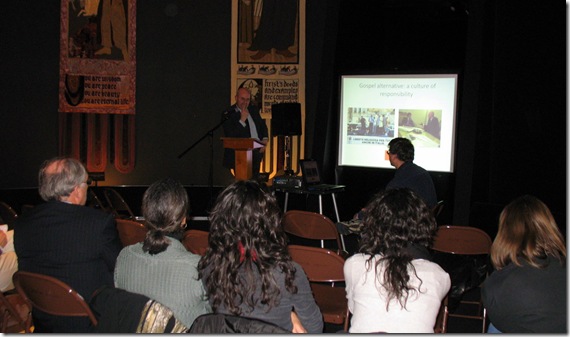This past week we enjoyed hearing from Dr. Leonardo De Chirico during his visit to Wheaton from Rome, Italy. Here is one of many lessons that we learned, expressed in my own words.
After the blazing soccer ball reached the back of the German net, apartments throughout Italy exploded with cheer. The final goal was replayed several times along with Pavarotti’s version of “Nessun dorma” from Puccini’s “Turandot.” With his three climactic “vinceros” at the end of the aria (translated “I shall win”), the ball rose, arched, and landed sweetly and safely in the corner of the net. The subsequent unleashing of euphoria defied description. Waving, cheering, and chanting resounded throughout the streets and into the cobblestone piazzas. The central fountain of the Piazza Campo dei Fiori (Field of Flowers) became a stage on which the most clamorous stood and chanted, “C’í non salta un Tedesco è!” – He who does not jump is a German! Soon everyone in the piazza was laughing, jumping, and singing.
As the evening festivity continued, the terraces around the piazza filled with spectators. From one such window emerged an elderly gentleman in his undershirt, enjoying a smoke. A few young men noticed the resemblance of this fellow to the late Fascist dictator Benito Mussolini. They shouted, “Look up, look up” and began calling to the second story window, “Il Duce, Il Duce” (Mussolini’s nickname translated “the Leader”). Soon others were allured by this phenomenon. The old man played the part with delight. Initially, I thought he was a professional actor since he performed so well; then I realized he was simply Italian. Others quickly joined in and soon the entire piazza was looking to the same window where the old man with the prominent hooked nose and protruding chin enjoyed his moment of fame. The crowd continued to chant, “Duce, Duce, Duce!” as the Benito look-alike waved and blew kisses to his adoring fans.
Among the various lessons we learned in the Roman piazza that evening is the importance of having a leader. God has created us to follow him; men and women cannot function otherwise. However, from the Greek philosopher Protagoras to the blue-eyed Sinatra of Hoboken, man has measured meaning by himself and has sought to live his own way.
In the name of Christian mission, the Church’s privilege and opportunity is to help our non-Christian friends recognize that the innate desire to follow a leader will only be satisfied when we embrace the Lord Jesus Christ. He is the King to whom we appropriately look up and in whom our souls find true meaning.
For more information about Leonardo’s ministry in Rome, click here.





